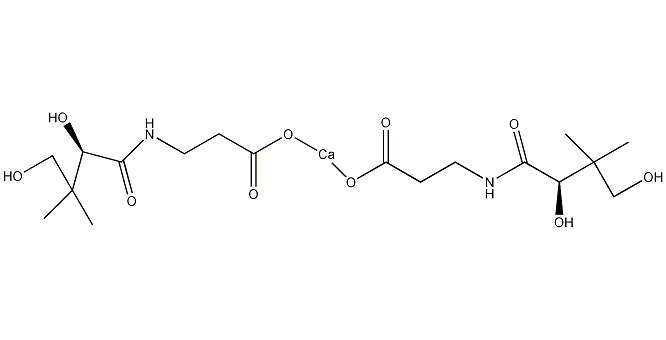
Structural formula
| Business number | 03RA |
|---|---|
| Molecular formula | C18H32CaN2O10 |
| Molecular weight | 476.54 |
| label |
Calcium D-pantothenate, Vitamin B5, (R)-(+)-N-(2,4-Dihydroxy-3,3-dimethyl-1-oxobutyl)-β-alanine hemicalcium salt, Calcium N-(2,4-dihydroxy-3,3-dimethylbutyryl)-β-aminopropionate, Vitamin B5 standard, calcium pantothenate, Calcium D-pantothenate, Food and feed additives |
Numbering system
CAS number:137-08-6
MDL number:MFCD00002766
EINECS number:205-278-9
RTECS number:RU4375000
BRN number:3769272
PubChem number:24893098
Physical property data
1. Properties: White needle-like crystals or powder. Slightly sweet, but turns slightly bitter, moderately hygroscopic, and stable to air and light. The degree of hydrolysis depends on the pH value. The aqueous solution with a pH between 5 and 7 is the most stable. The aqueous solution is unstable during hot pressure sterilization. Therefore, filtration sterilization must be used for disinfection.
2. Melting point (decomposition, ℃): 195-196
3. PH Each gram of this product is dissolved in 2.8 ml of water, and the pH of the aqueous solution is 7.2-8.0.
4. Solubility: Soluble in glycerol, slightly soluble in ethanol and acetone. Hygroscopic, stable to air and light.
Toxicological data
Acute toxicity data:
Rat oral LD50:>10mg/kg
Rat abdominal LD50: 820mg/kg
Rat skin LD50 : 3400mg/kg
Rat intravenous LD50: 830mg/kg
Mouse oral LC50: 10mg/kg
Mouse abdominal LC50: 920mg/kg
Mouse skin LCLo: 2700 mg/kg
Mouse vein LC50: 910mg/kg
Ecological data
None
Molecular structure data
None
Compute chemical data
1. Reference value for hydrophobic parameter calculation (XlogP):
2. Number of hydrogen bond donors: 6
3. Number of hydrogen bond acceptors: 10
4. Number of rotatable chemical bonds: 10
5. Number of tautomers: 3
6. Topological molecular polar surface area (TPSA): 219
7. Number of heavy atoms: 31
8. Surface charge: 0
9. Complexity: 233
10. Number of isotope atoms: 0
11. Determine the number of atomic stereocenters: 2
12. Uncertain number of atomic stereocenters: 0
13. Determine the number of chemical bond stereocenters Number: 0
14. Number of uncertain chemical bond stereocenters: 0
15. Number of covalent bond units: 3
Properties and stability
D-calcium pantothenate has the physiological activity of vitamins, while L-calcium pantothenate has no biological activity.��Activity. Calcium D-pantothenate is involved in the metabolism of protein, fat, and sugar in the body.
Storage method
Store in a cool, dry place.
Synthesis method
1. It is obtained from isobutyraldehyde through formaldehyde hydroxymethylation, addition, hydrolysis, acidification, lactonization, acylation and addition.
2. Calcium β-aminopropionate generated by the reaction of acrylonitrile, ammonia, sodium hydroxide, and calcium oxide and α-hydroxy-β generated by the reaction of isobutyraldehyde, formaldehyde, and sodium cyanide, β-Dimethyl-γ-butyrolactone is prepared from DL-calcium pantothenate, which is then separated and prepared.
Purpose
1. This product is a vitamin drug and a component of coenzyme A. Among the mixed calcium pantothenate, only the dextral body has vitamin activity and participates in the metabolism of protein, fat, and sugar in the body. Used for vitamin B deficiency, peripheral neuritis, and colic after surgery. Used in combination with vitamin C to treat disseminated lupus erythematosus. The lack of calcium pantothenate in the human body has the following symptoms: (1) Growth cessation, weight loss, and sudden death. (2) Skin and hair disorders. (3) Nervous system disorders. (4) Digestive organ disorders and liver dysfunction. (5) Affect antibody formation. (6) Accessory renal disorder. The human body needs about 5 mg of calcium pantothenate (calculated as pantothenic acid) every day.
2. Nutritional supplements. Mainly used in medicine, food additives and feed additives, it is an indispensable trace substance for human body and animals to maintain normal physiology. Except for special nutritional foods, the dosage must be less than 1% (calculated as calcium). When milk powder is fortified, it is 10mg/100g; adding 0.02% to soju and whiskey can enhance the flavor; adding 0.02% to honey can prevent winter crystallization; it can buffer the bitter taste of caffeine and saccharin.

 微信扫一扫打赏
微信扫一扫打赏

